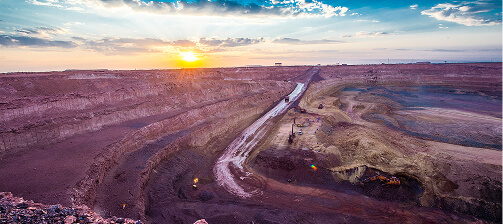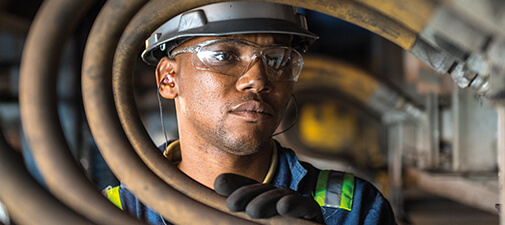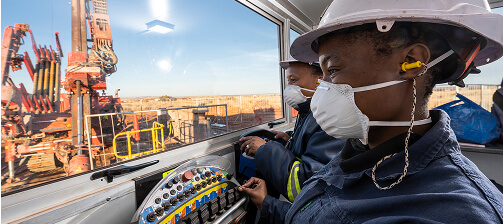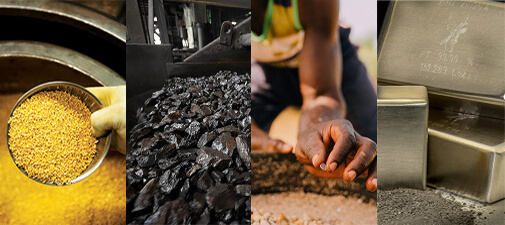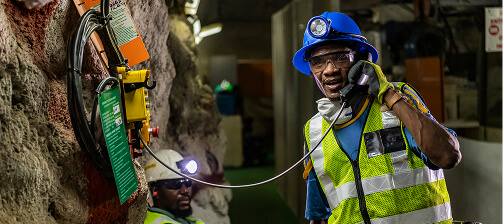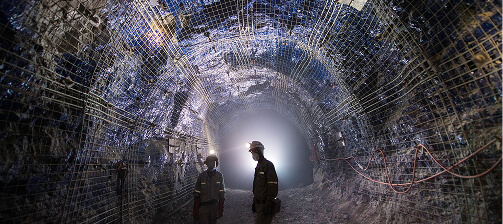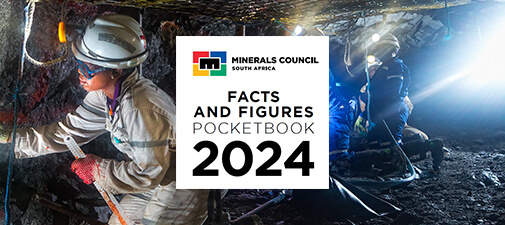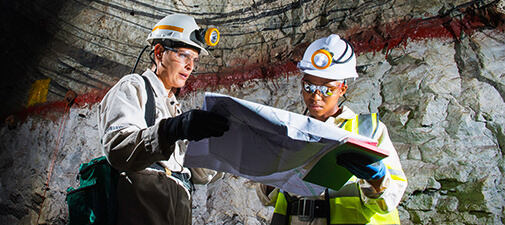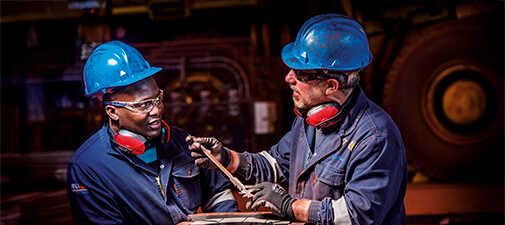The Chamber of Mines welcomes the opportunity to engage with all sectors of society that are engaging on the debates about the place of mining in South Africa’s future. There may sometimes be areas of disagreement, but we do believe that engagement on the basis of problem-solving with interested parties, and negotiation with parties with direct interests, such as trade unions, is the best basis for progress for our industry and our country.
The Chamber of Mines is responding on behalf of all its members to the memorandum presented to the Chamber by the EFF on 27 October 2015.
Mining companies have made significant strides in their contribution to improving the lives of their employees, their families, communities living around mines, and the wider population. This is in addition to the crucial contribution that the industry has made to the South African economy. Much of the country’s economic infrastructure is based on the mining sector, the industry’s supply chain and the beneficiation of minerals mined. Well considered policies will no doubt enhance value-addition of the entire mining value chain in our economy.
In acknowledgement of the negative aspects of the mining sector’s role in South Africa’s history, the Chamber of Mines and its members have, since 1994, made concerted efforts to repair and compensate for damage done as far as is practically possible. We know that this is necessary both to sustain and grow the industry and to make good for the effects of historical discrimination and inequality. This is a process that continues.
Education is absolutely key to South Africa’s future, to enhance opportunities for our citizens and to grow our industry. The Chamber and its members are committed to developing the skills of both current and future employees and, in particular, those of the youth. In the 2014 financial year alone, the Chamber and its members invested R5 billion in skills development and education projects. The focus areas range from tertiary education bursaries for scarce skills, through technical and artisan skill training programmes and ABET initiatives.
In the past 10 years the members of the Chamber have supported around 10 000 students per annum through bursaries at a number of tertiary institutions. A focus on the youth means that one third of the professionals employed in the mining industry are below the age of 35, as are 37% of clerical and support workers and 38% of artisans.
We are aware that the industry’s safety performance must continue to improve. Over the past two decades the industry’s fatality rate has declined by 87% through concerted collaborative work between government, mining companies and trade unions. While the significant improvement in our industry’s safety performance is gratifying, we know we cannot rest until every employee leaves work safe and healthy every day. And where we fail in that duty, employees and their families are entitled to care and fair compensation.
For the past four years the Chamber has – through the Ex-Mineworker Project – supported the Department of Health in improving access for former miners to benefit medical examinations, which is the step before identification of occupational lung diseases and eligibility for compensation. As a result of this support, occupational health services have been improved in the Eastern Cape, Free State, Gauteng, KwaZulu-Natal and North-West. Current support is concentrated on improving the administration and payment systems overseen by the Compensation Commissioner, which is a statutory body under the auspices of the Department of Health and not an industry body.
At the November 2014 Mine Health and Safety Summit industry stakeholders agreed a new set of 10-year milestones for occupational health and safety, including eliminating fatalities, injuries and diseases. We strongly believe that these – along with clear action plans for all stakeholders - will accelerate the industry’s journey to Zero Harm.
More needs to be done when it comes to provision of accommodation options, at and near mines, for mine employees and their families. This is something that many mines have begun to do very well, but there are gaps, and much still needs to be done better. There are various initiatives currently underway in this regard: Mining companies have made significant contributions to the setting up of infrastructure and services, as well as social amenities and educational facilities in mining communities. The legacy of the migrant labour system presents probably the most difficult challenge facing the industry and all its stakeholders. We are mindful, however, that in addressing one ill we must not create another. Rural communities all over southern Africa depend on remittances from mineworkers, and we would not want them to be further burdened as a result of dramatic shifts in recruitment patters.
The Chamber and its members respect and comply with the country’s employment laws, and the Chamber engages constructively in the relevant forums to discuss policy and legislative changes, where these are required. The current system of collective bargaining has been in operation for more than three decades and has delivered improved earnings and other conditions of employment for mineworkers. Stats SA data shows that mineworkers are amongst the top 25% of wage earners in South Africa and have access to benefits that are lacking in many other labour intensive industries. That said, we are committed to a constructive process of modernizing our industry that will see the upskilling of mining employees, with the benefits that that brings.
Notwithstanding widespread allegations to the contrary, the industry continues to pay all taxes and other state revenues due. Annual company taxation paid by mining companies over the last 10 years has averaged between R15 and R20 billion per annum. Additionally, since 2010 the mining industry pays – on average – an additional royalty to the state of R5 billion per annum. Further, the industry is one of the largest contributors to capital investment in the country, having invested between R60 and R70 billion on capital per annum in the past decade. This is about 20% of total private sector investment in the economy.
The Chamber acknowledges that the impact of job losses resulting from the commodities downturn is serious – for employees, communities and the country as a whole. The Chamber has and will continue to participate fully in various processes, including the MIGDETT, in seeking to address this and other issues. The Chamber is a signatory to the recent Leaders’ Declaration: Mining industry commitment to save jobs and ameliorate the impact of job losses. We are also fully supportive of the Presidential Framework Agreement process that is addressing the negative impacts of the migrant labour system and is focused on creating sustainable mining communities. Critical to all of these discussions is the recognition of the need for a thriving, sustainable mining industry that is able to deliver benefits to all those involved.
Beneficiation is an important subject for the country and the mining industry. There is already a significant industrial base that supplies goods and services into the South African mining industry. Downstream of the mining sector another R300 billion in economic activity and 200 000 jobs are created in beneficiation industries. Currently, 98% of South Africa’s cement, 80% of the steel, 50% of the chemical feedstocks and 30% of our liquid fuel requirements are produced locally by industries using South African mined products. South Africa also accounts for the fabrication of 9% of the world’s platinum catalytic converters and produces a wide array of beneficiated products for exports to global markets. If one includes the upstream and downstream industries the mining cluster created around 1.3 million jobs (495 000 direct and 800 000 indirect), with significant contributions to the economy and to the fiscus. All stakeholders need to collaborate more effectively to create a better investment environment to grow the beneficiation base in South Africa.
No single stakeholder can address the challenge of artisanal and small scale mining on its own, whether this be illegal or not. Collaboration is key. The industry, individually and through the Chamber of Mines, remains committed to working with other stakeholders to address this serious challenge. In its effort to contribute to the growth of emerging miners the Chamber has started a programme of recruiting and supporting emerging miners through a special Emerging Miners Desk. The Chamber provides a mentoring leadership group that supports our emerging miners and good successes are being recorded. The Mine Health and Safety Council is currently developing a toolkit to assist small-scale miners in complying with occupational health and safety standards.
We would welcome the opportunity to meet directly with the leadership of the EFF to properly discuss the matters they have raised. While marches and memoranda play an important role in the life of any democracy, real change can only come when there is proper direct engagement on specifics.
Mike Teke
President, Chamber of Mines
Roger Baxter
CEO, Chamber of Mines
25 November 2015
![Logo MCSA [logo]](/templates/chamber/images/logo.svg)

